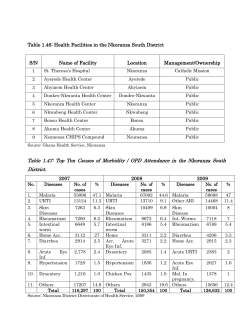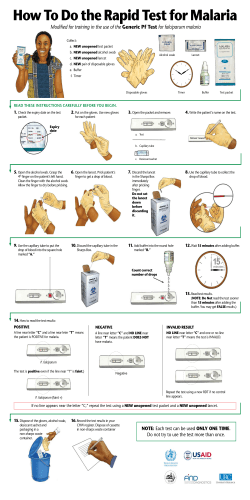
Document 386847
Malaria Prophylaxis in Pregnant Women Victoria Fischman March 9, 2012 GOALS FOR UNDERSTANDING • Global Scope of malaria and maternal malaria • Importance of pregnant women in context of malaria • Malaria in humanitarian crisis • Intermittent Preventative Treatments • Means for measuring coverage and impact GLOBAL SCOPE OF MALARIA • 3.3 billion people at risk worldwide • 98% of Malarial deaths in Africa • Second leading cause of death from infectious diseases after HIV/AIDS in Africa MALARIA FAST FACTS • WHO estimates a child dies every 45 seconds from Malaria – Makes up 20% all childhood deaths • 50 million women become pregnant in Malaria endemic areas yearly – Half in areas where P. falciparum endemic CDC MALARIA MAP • Red: Malaria Everywhere • Yellow: Malaria in Provence • Green: No Known Malaria http://cdc-malaria.ncsa.uiuc.edu/ MALARIA DURING PREGNANCY • Leads to 5-12% of all low birth weights in children worldwide • Contributes to 35% of all preventable low birth weights in children worldwide • Low birth weights can lead to premature births and intrauterine growth retardation • 75,000-200,000 infant deaths worldwide each year attributed to malarial infection during pregnancy PREGNANT WOMEN AT HIGH RISK • Pregnant women have an increased susceptibility to contracting malarial infection because of changes in their immune system related to the pregnancy • Pregnant women more susceptible to P. falciparum specifically because of placenta provides a novel intervillous space for cytoadherence PLACENTAL MALARIA CDC/Edwin P. Ewing, Jr., M.D. http://phil.cdc.gov/phil/details.asp MATERNAL IMMUNE RESPONSE • Typically, immunity built up after several years as the human’s cytoadherence molecules are depleted • When women become pregnant, placenta develops new space for cytoadherence • Even if the woman had built up previous immunity in her endothelial cells, the placental lumen provides a new location for parasite development EFFECTS OF MULITPLE PREGNANCIES • Acquired immune effects seen in the differences of severity of malarial infection depending if the woman is primigravida, or multigravida, because of the idea of “pregnancy immunity.” • Mother loses previously acquired immunity once pregnant, during pregnancy able to regain some of that immunity • Will counteract infection in subsequent pregnancies EFFECTS OF MULITPLE PREGNANCIES • Primigravidae women less likely to have immunity from infection • Multigravidae women, more likely because of “Pregnancy Immunity” • Mother loses previously acquired immunity once pregnant, during pregnancy able to regain some of that immunity • Will counteract infection in subsequent pregnancies DIAGNOSIS • Pregnant women difficult to diagnose because of differences in placental and peripheral blood parasitaemia • Placenta could have many infected red blood cells while none detected from peripheral blood • Placental malaria often not diagnosed CLINICAL MANIFESTATIONS • Depends on level of acquired immunity pre-pregnancy • High/stable transmission: mothers generally asymptomatic even though immunity wanes during pregnancy • Maternal anemia, low birth weight • Low/unstable transmission areas: mother and fetus at risk for most severe consequences • Maternal anemia, severe malarial disease, low birth weight, premature birth, fetal loss CONTEXT HUMANITARIAN CRISES: TSUNAMI • Population migration • Women with low immunity moving into areas of high transmission or vice versa • New pools of standing water • Perfect breeding grounds for mosquitoes • Close proximity of people with active infections and non-infected persons HISTORY MALARIA PREVENTION • 1950s first preventative malaria strategies with chemoprophylaxis with chloroquine • 1980s became a public health issue • Chloroquine resistance and poor adherence (weekly/bi-monthly administration required) led to poor effectiveness • 2004 Intermittent preventative treatment (IPT) replaced chemoprophylaxis INTERMITTENT PREVENTATIVE TREATMENT • Administration of a single, curative dose of an effective anti-malarial drug • Current recommended drug is sulfadoxinepyrimethamine • Administered at least two times during pregnancy • After first trimester and first sign of quickening • Doses must be at least one moth apart SULFADOXINE-PYRIMETHAMINE • Some instances of resistance • 2005 WHO convened to review the efficacy of IPT-SP • Used children <5 as a measure • Found that at its lowest, efficacy dropped to 61% but still deemed effective • Data is hard to extrapolate to pregnant women, and randomized controlled trials must deal with ethical issues because mortality outcomes are used as measures TREATMENT RESTRICTIONS • Pregnant women shouldn’t take Primaquine (typically used to prevent relapse of P. vivax and P. ovale) • associated risk of intravascular haemolysis in the mother and fetus • Tetracyclines and doxycycline excluded for adverse effects on bone growth with fetus LOOKING FORWARD • Further research needed surrounding sulfadoxinepyrimethamine • Optimal timing and dosage • Resistance/efficacy • Mefloquine: Newest alternative • Long half life like sulfadoxine-pyrimethamine, but more research needed to deem safety • Still expensive ANTENATAL CARE RECOMMENDATIONS • 4 visits recommended, with 3 after first quickening • IPT should be administered at all 3 visits past first trimester to increase chance of receiving at least 2 doses IPT • HIV+ mothers have recommended dosage of at least 3 because of higher likelihood of infection and parasite densities • Combination with other interventions important ANTENATAL CARE RECOMMENDATIONS http://www.cdc.gov/malaria/malaria_worldwide/reduction/iptp.html INSECTICIDE TREATED NETS • Should be given to all pregnant women in areas of malaria transmission • Only safe method of prevention for pregnant women during first trimester http://www.cdc.gov/malaria/malaria_worldwide/reduction/itn.html CASE STUDY COTE D’IVOIRE • Conducted between March and September 2008 • 6 antenatal facilities selected, with requirement of also providing HIV prevention of mother to child transmission • Estimated placental malaria rate from neighboring, Ghanaian data, at 15% • Goal: Evaluate coverage and effectiveness of IPTSP since 2004 Implementation based on WHO guidelines CASE STUDY COTE D’IVOIRE • 2,044 women • All gave birth at one of six selected clinics • Blood samples taken from umbilical cord and placenta right after birth • Blood sample taken from neonate 2 hours after birth CASE STUDY COTE D’IVOIRE: RESULTS • 83.7% of women had received at least one dose of IPT-SP • 49.8% had received at least two doses • no significant differences found for age, gravidity, or HIV status of the mother CASE STUDY COTE D’IVOIRE: RESULTS • Clear dose-effect relationship with IPT-SP and placental malaria • 82% reduction in placental malaria for the women who had taken at least two doses of IPTSP • 68% reduction in placental malaria for those women who had taken one dose of IPT-SP CASE STUDY COTE D’IVOIRE: RESULTS • Overall, there was a decrease of placental malaria prevalence, to 4.8% • compared to 2004 African studies recorded prevalence rates of 10.6-20.5% • Data sets hard to compare because of location of data collection and population characteristics, such as the proportion of primigravidae women. CASE STUDY COTE D’IVOIRE: TAKEAWAYS • Only 53% of women visited the antenatal clinic at least three times. • Challenges to coverage: • staff shortages to deliver the dosage • limited drug supplies • difficulty to access of antenatal care PROGRESS INDICATORS • 2007, WHO outlined several important indicators that should be routinely measured both in clinics and through household surveys • Evaluate progress/effectiveness of intervention delivery, and outcomes and impact. http://whqlibdoc.who.int/publications/2007/9789241595636_eng.pdf SAMPLE SURVEY http://whqlibdoc.who.int/publications/2007/9789241595636_eng.pdf GOALS FOR UNDERSTANDING • Global Scope of malaria and maternal malaria • Importance of pregnant women in context of malaria • Malaria in humanitarian crisis • Intermittent Preventative Treatments • Means for measuring coverage and impact REFERENCES 1. Center for Disease Control and Prevention. CDC Malaria Facts. Center for Disease Control and Prevention. http://www. cdc.gov/malaria/about/facts. html. Published February 8, 2010. Accessed February 8, 2012. 2. Henriette A Vanga-Bosson, Patrick A Coffie, Serge Kanhon, Caroline Sloan, Firmin Kouakou, Serge P Eholie, Moussa Kone, François Dabis, Hervé Menan, and Didier K Ekouevi. Coverage of intermittent prevention treatment with sulphadoxinepyrimethamine among pregnant women and congenital malaria in Côte d'Ivoire. Malaria Journal. 2011, 10:105 doi:10.1186/1475-2875-10-105. 3. Valérie Briand, Gilles Cottrell, Achille Massougbodji, and Michel Cot. Intermittent preventive treatment for the prevention of malaria during pregnancy in high transmission areas. Malaria Journal. 2007, 6:160 doi:10.1186/1475-2875-6-160. 4. Impact Malaria. Placental sequestration. Impact Malaria.http://en.impactmalaria.com/iml/cx/en/layout.jsp?cnt=E130BB59-A482-45CE-A602-B48634099C9D. Accessed February 8, 2012. REFERENCES 5. Brabin BJ. An analysis of malaria in pregnancy in Africa. Bulletin of the World Health Organization 1983;61(6):1005-16. http://www.ncbi.nlm.nih.gov/ pmc/articles/PMC2536236/?page=1. 6. Frank P Mockenhaupt, George Bedu-Addo, Christiane von Gaertner, Renate Boyé, Katrin Fricke, Iris Hannibal, Filiz Karakaya, Marieke Schaller, Ulrike Ulmen, Patrick A Acquah, Ekkehart Dietz, Teunis A Eggelte, and Ulrich Bienzle. Detection and clinical manifestation of placental malaria in southern Ghana. Malaria Journal. 2006, 5:119 doi:10.1186/1475-2875-5-119. 7. Witt, David. Post-Tsunami Malaria in Indonesia—The Pivotal Contributions of Permanente Physicians. The Permanente Journal. 2005; 9.4: 69-71. 8.World Health Organization. Malaria in Pregnancy: Guidelines for measuring key monitoring and evaluation indicators. http://whqlibdoc.who.int/ publications/2007/9789241595636_eng.pdf. Published 2007. Accessed March 4, 2012. REFERENCES 9. World Health Organization. Technical Expert Group meeting on intermittent preventive treatment in pregnancy (IPTp). http://whqlibdoc.who.int/ publications/2008/9789241596640_eng.pdf. Published 2008. Accessed March 4, 2012. 10. Center for Disease Control and Prevention. How to Reduce Malaria’s Impact. Center for Disease Control and Prevention. http://www.cdc.gov/malaria/ malaria_worldwide/reduction/index.html. Published February 8, 2010. Accessed February 8, 2012.
© Copyright 2026









